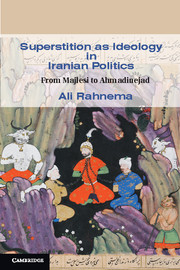Book contents
- Frontmatter
- Contents
- Preface and Acknowledgements
- Introduction
- Part I POLITICIZING OCCULT ISLAM
- Part II POPULAR SHIʿISM
- 4 Milieu, Childhood, Sanctity and Fame
- 5 From Conceptualization to Officialization of a Religio-political Ideology
- 6 Deficiency and Defectiveness of the Human Mind
- 7 Society Needs the Leadership of Jurists and/or Kings
- 8 Superstitious Education
- 9 Reconfigurating the Necessities of Belief
- 10 Majlesism as an Ideology
- Conclusion
- Bibliography
- Index
- List of Books in the Series
10 - Majlesism as an Ideology
Published online by Cambridge University Press: 05 June 2012
- Frontmatter
- Contents
- Preface and Acknowledgements
- Introduction
- Part I POLITICIZING OCCULT ISLAM
- Part II POPULAR SHIʿISM
- 4 Milieu, Childhood, Sanctity and Fame
- 5 From Conceptualization to Officialization of a Religio-political Ideology
- 6 Deficiency and Defectiveness of the Human Mind
- 7 Society Needs the Leadership of Jurists and/or Kings
- 8 Superstitious Education
- 9 Reconfigurating the Necessities of Belief
- 10 Majlesism as an Ideology
- Conclusion
- Bibliography
- Index
- List of Books in the Series
Summary
The corpus of Majlesi's scholastic-cum-propaganda work presents itself as an ideology aimed at thought manipulation and social engineering with the objective of inculcating the masses with an anti-rational and superstitious world outlook. Majlesi homogenizes society according to the criteria and standards that he chooses and establishes. He spins auxiliary and sub-auxiliary necessities from the fundamental necessities – in the realm of beliefs and rites – and imposes them on believers as religious truths and prerequisites of piety. As with any ideology, Majlesi defines and negotiates the political and religious role of social players with the intention of consolidating the prevailing bipolar power relationship between the masses and the ruling king-cleric duo.
To construct his ideology Majlesi employs and promotes substitute concepts, effectively overshadowing the fundamental necessities of Islam. The ersatz concepts employed by Majlesi are not alien to a Shiʿi hadith-based tradition, but could be categorized as peripheral or marginal issues in relation to the main Islamic discourse. Majlesi's articulation and promotion of a “complementary Shiʿi frame of reference”, based on his selection of reports, gradually becomes an “alternative frame of reference” and eventually becomes the hegemonic identifier of Shiʿism. As such, parallels to the fundamental necessities of the faith are developed. According to the Islamic tradition, the four devotional rites of prayer, fasting, pilgrimage and the payment of the wealth tax are the main tools for attaining proximity to God and seeking felicity in the hereafter.
- Type
- Chapter
- Information
- Superstition as Ideology in Iranian PoliticsFrom Majlesi to Ahmadinejad, pp. 275 - 292Publisher: Cambridge University PressPrint publication year: 2011



